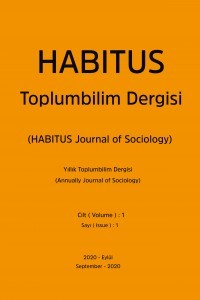HAS MULTICULTURALISM BEATED THE NATIONALISM?: EUROPEAN SAMPLE
In this study, it was analysed that multiculturalism, which globalization has offered as a solution to cultural differences, has triggered again nationalism in the process of bringing national identities into the forefront again with postmodernism. In the historical process, various cultural policies have been applied over national identities and attempts have been made to solve identity crises based on different acceptances in the lived period. Thus, modernity with nation-state political form has attempted to create a homogeneous nation identity by destroying the sub-identities; likewise the postmodern thought is continuing to take steps towards eliminating upper identity by putting a global ideology that will disrupt social integrity with the emphasis on cultural identities and differences. Multiculturalism, which one of the identity politics of globalization, is pushing the nation-state structure and raising the representation crises of different identities. This identity politics as a solution also carries the risk of turning into nationalism. In this study, it was analyzed that the different understandings of multiculturalism in Europe create this risk rather than reconciliation.
Anahtar Kelimeler:
Multiculturalism, Identity, Nationalism, Globalization
___
- Aggestam, L., Hill, C. (2008). The Challenge of Multiculturalism in European Foreign Policy, International Affairs, 84(1), 97-114.
- Barın, T. (2016). Farklılıkların Bir Arada Yaşamasında Liberal Bir Yaklaşım: Çokkültürlülük Teorisi, Yıldırım Beyazıt Hukuk Dergisi, (2), 57-87.
- Cesari, J. (2007). Muslim Identities in Europe: The Snare of Exceptionalism, A. Al-Azmeh ve E. Fokas (Ed.), Islam in Europe: Diversity, Identity and Influence içinde (49-67), Cambridge: Cambridge University Press.
- Duman, M. Z. (2007). Modernden Post-Moderne Geçişte Kimlik Tartışmaları ve Çokkültürlülük, Uluslararası İlişkiler, 4(13), 3-24.
- Duman, M. Z. (2009). Küreselleşme, Kimlik ve Çokkültürlülük, Sosyal Bilimler Dergisi, 2(1), 93-112.
- ISSN: 2718-0433
- Yayın Aralığı: Yıllık
- Başlangıç: 2020
- Yayıncı: Mine ALPTEKİN
Sayıdaki Diğer Makaleler
KAMUSAL ALAN-ÖZEL ALAN AYRIMI VE HABERMAS’IN KAMUSAL ALAN DÜŞÜNCESİ
RUTİN AKTİVİTELER TEORİSİ BAĞLAMINDA DİJİTALLEŞEN DÜNYADA SİBER SUÇ MAĞDURLARI
Buket Cansu ULUDAĞ, Serdal FİDAN
CİNSELLİK VE DUYGULAR: BİR GÖZDEN GEÇİRME
ORTAK YAŞAMDAŞLIK BİLİNCİ OLARAK ONTOLOJİLER ARASI DİYALOG VE KARŞILAŞTIRMALI SİYASET FELSEFESİ
SİYASAL PAZARLAMA SÜREÇLERİNDE LİDER UNSURUNUN SOSYOLOJİK ROLÜ ÜZERİNE BİR DEĞERLENDİRME
HAS MULTICULTURALISM BEATED THE NATIONALISM?: EUROPEAN SAMPLE
RUSYA'NIN UKRAYNA İŞGAL GİRİŞİMİ BAĞLAMINDA STRATEJİK VE AKSİYOLOJİK BİR DEĞERLENDİRME
